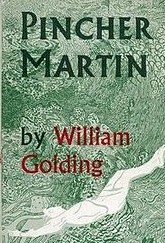Inspiring Older Readers
 posted on 12 Feb 2017
posted on 12 Feb 2017
Pincher Martin by William Golding
When I'm doing book reviews for use on the Letterpress site I try and make it a rule to say just enough to spark some interest in the reader in the hope they will go off and read the book for themselves. Consequently, avoiding spoilers of the plot is a key objective - no-one wants to know plot lines that sit at the heart of the book and which are crucial to the outcome. However, on this occasion I have to tell you now that it's impossible to say what needs to be said about Pincher Martin without revealing the crucial final twist. So you have been warned!
This was Golding's third novel and follows the hugely successful Lord of the Flies. This new story starts dramatically with us inhabiting the nightmare world of Christopher (Pincher) Martin who has just been blown off his warship whilst on patrol during World War Two. In the water he struggles to gain control of the chaos into which he has been thrown, trying hard to reorientate himself and to think about what he needs to do to survive. What we get isn't exactly a stream of consciousness in the Modernist sense but more a flood of impressionistic, individualised sensations and impressions as Martin sinks and surfaces, struggles to kick off his sea boots and inflate his life- vest in the correct manner.
As Martin slowly gets his bearings he finds himself washed onto some kind of rocky outcrop in the sea and he begins his struggle with the elements, hoping to survive long enough to be rescued. His time on the rock begins with Martin being mainly rational and logical about what he needs to do to survive. He anticipates illness, potential deadly thirst, exposure to the elements and a restricted diet scavenging barnacles and shellfish. But slowly he lapses further and further into a deranged or hallucinogenic state and we are allowed a chance to look into Martin's memories and relationships - where we discover that he wasn't a very savoury character.
Increasingly the delusional Martin begins to see parallels between himself and Prometheus - the Titan of Greek mythology who steals fire from the Gods and is punished for eternity by being chained to a rock where every day his liver is pecked out by an eagle. Pincher Martin's winged nemesis isn't an eagle but the seagulls that scavenge the rock.
The ending of the book has been seen as controversial since its publication. There are critics who simply dismissed it as tricksy and others who felt it tried to deal with an important philosophical issue. Following an apocalyptic storm which features 'black lightening' we find the focus of the book suddenly switches from Martin's point of view to that of the man sent to pick up his recovered dead body. The final sentence tells us that Martin died almost immediately he entered the sea, before he could even remove his sea boots.
When he was interviewed about the book and its ending Golding was clear that Martin's experiences were post-death. He had, Golding claimed, an ego and a sense of self that just wouldn't let go. Given Golding's Catholicism other critics have interpreted the book as an exploration of the religious notion of Purgatory while others have asserted that Martin's experiences were what instantaneously passed through his mind at the very moment of death.
However you react to the final revelation ( I'm personally happy to go with Golding's own interpretation of what he thought he was doing), the power of the book is undeniable. The visceral struggle for survival is essentially unheroic in a way that makes it paradoxically heroic and draws the reader into an identification with Martin's humanity. But all this is balanced by our knowledge that he's been a pretty lamentable character prior to this moment and that just maybe his punishment has its own uncomfortable logic in a universe where morality has meaning.
Terry Potter
February 2017